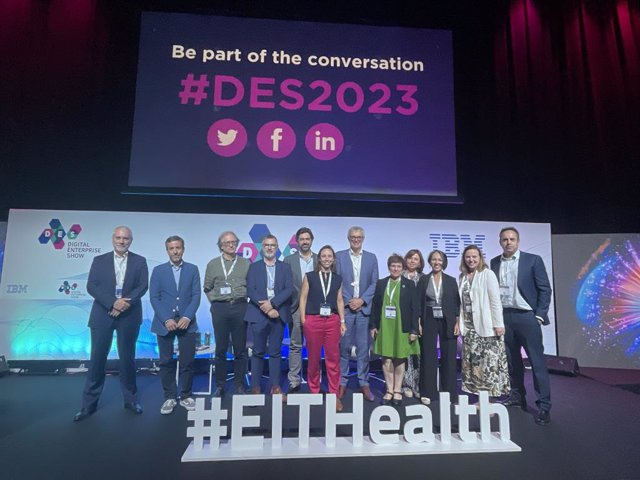Flexibility, intelligent financing, agile regulations, professional training and interoperability are aspects that our health system will have to face to implement it successfully.
Spain is in a privileged position for the integration of the European Health Data Space
The meeting is one of the 10 that are part of a pan-European initiative, promoted by the EIT Health Think Tank and with the support of the European Commission. Its conclusions will feed into a report to be presented in Brussels at the end of the year
MALAGA, June 15.
The European Health Data Space (EHDS) is a unique opportunity to advance innovation and digital health in Spain. This is confirmed by experts gathered by EIT Health Spain, EIT Health's Co-Location center (regional hub), which is part of the European Institute of Innovation and Technology (EIT), a body of the European Union, in a debate within the framework of the Digital Enterprise Show in Malaga under the title 'Innovation based on data and the European Health Data Space: is Spain ready?'.
pan-european initiative
The meeting is part of a pan-European initiative promoted by the EIT Health Think Tank and coordinated by Andrzej Rys, Principal Scientific Adviser of the European Commission's Directorate-General for Health. Under this initiative, similar meetings will be held in 10 European countries, the conclusions of which will feed local reports and a European one that will be presented at the end of this year in Brussels.
With the objective of analyzing the level of preparation of Spain for this legislation, key in the construction of the European Health Union, the experts addressed six areas of implementation: data governance, financing, capacities and skills, data quality, the link between data for healthcare use and use in innovation, and aspects of education and communication for professionals, patients and citizens.
For Izabel Alfany, General Director of EIT Health Spain, the European Health Data Space is a unique opportunity for the transformation of our health system, for value-based care for patients and, especially, to strengthen innovation in health in Spain. and Europe.
"As a country we have a magnificent starting position, due to our high level of digitization. We need to analyze our strengths and weaknesses so that this regulation is implemented quickly and successfully in our country, and we are able to take full advantage of the great potential offered by digital health data," Alfany said.
Experts agree that the successful implementation of the EHDS will depend to a large extent on a specific regulation, as well as the governance model, financing where it is needed and adequate resources.
At the same time, they indicate that the ecosystem of regulations, procedures, standards and interoperability that is being developed is a great opportunity to direct financing towards the right projects and prioritize what is really relevant.
Towards a data culture in health
All the experts agree in affirming that Spain has a privileged position to integrate the EHDS. Ana Miquel, head of Health Innovation and International Projects of the Madrid Community Health Department and member of the Steering Committee of the pan-European initiative of EIT Health for the implementation of the EHDS, assured: "we are starting from a very good situation regarding the digitization, a very mature level that positions Spain as a leading country for change".
For his part, Pedro Luis Sánchez, director of Farmaindustria's Department of Studies, pointed out that the measurement of health results "is increasingly important in global health decision-making, because, among other things, it can improve access to patients to new drugs and increase efficacy.
However, there are several challenges for our country that urgently need to be addressed. For Carlos Tellería, from the Aragonese Institute of Health and representative in Gaia-X of the Joint Action of the European Commission to implement the EHDS (TEHDAS), the governance model of the European Health Data Space must be fully respectful of the privacy of users. patients, "but flexible enough to allow rapid cycles of research and innovation".
Joaquín Cayón, director of the Health Law and Bioethics Research Group of the 'Marqués de Valdecilla' Health Research Institute (IDIVAL), defended the implementation of the European Health Data Space "through specific digital health standards". To do this, he called for "abandoning defensive biomedical research that renounces an ambitious treatment of clinical data for fear of a restrictive legal framework."
Regarding the capacities of Spain, Montserrat Daban, director of Scientific Policies and Internationalization of BIOCAT, stated: "It is necessary to address the main gaps in capacities and competences to guarantee a secure and responsible exchange of health information for primary and secondary use". And she added that it is critical "to address interoperability issues to ensure that quality data can be interpreted and shared."
Data quality
For Francisco José Sánchez, coordinator of Digital Transformation of the Junta de Andalucía, it is important to "improve the quality of the data in our information systems, provide us with the necessary resources, raise awareness and train our professionals".
In this regard, Ana Miquel encouraged work on the implementation of standards "not only to facilitate the secondary use of health data", but also to improve the quality of the data itself.
Pedro Carrascal, general director of the Platform of Patient Organizations, defended that the EHDS "generates enthusiasm in patients, but also concern for the security of the data and the governance of these". For this reason, he called for "advancing in the integration of patients within the health system so that they participate in the transformation that its implementation will require."
The conclusions of this session within the DES 2023 will be incorporated into a national report on the situation in Spain with respect to the European Health Data Space whose presentation is scheduled for next autumn. Later, at the end of the year, EIT Health will present in Brussels a report with the evaluation of all EU countries regarding the EHDS.
About EIT Health
EIT Health is a network of the best innovators in healthcare, with approximately 130 members, and is supported by the European Institute of Innovation and Technology (EIT), a body of the European Union. We collaborate between countries to offer new solutions that allow European citizens to live longer and better.
As Europeans, we face the challenge of chronic diseases and multimorbidity, and we are aware of the opportunities that technology offers us to move beyond conventional approaches, prevention and healthy living. This requires innovative opinion leaders and efficient ways to bring innovative health solutions to market.
EIT Health addresses these needs. We connect all relevant healthcare players across Europe, ensuring the inclusion of all three sides of the "knowledge triangle", so that innovation occurs at the intersection of research, education and business, for the benefit of the citizenship.
EIT Health: Together for a healthy life in Europe.
For more information, visit: www.eithealth.eu
Media contact: Mara Belluco, EIT Health Spain communication manager, mara.belluco@eithealth.eu, tel. 34 93 402 08 00 or 34 627 089 665













